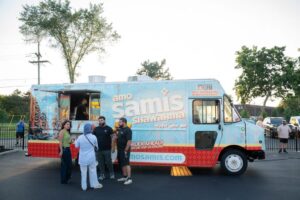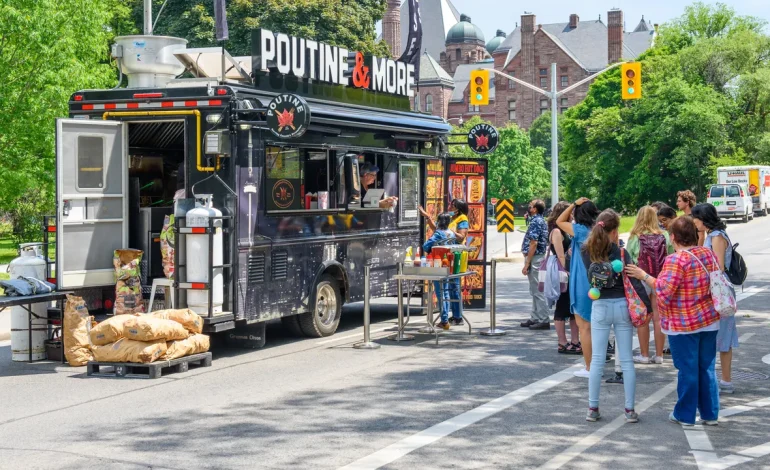DEARBORN – Over the past few years, food trucks have gained widespread popularity in Dearborn, with the city now hosting more than 30 licensed trucks offering a wide range of fast foods, such as shawarma, burgers, fried chicken, tacos, hot dogs and more. However, beginning in early September, the city will begin implementing new regulatory ordinances designed to limit where food trucks can operate — under the banner of promoting public safety and protecting traditional brick-and-mortar restaurants from unfair competition.
The new regulations, approved by the City Council in April, aim to reshape Dearborn’s thriving food truck scene after two years of trials and discussions regarding challenges that have emerged with the growth of this business sector. City officials cited numerous issues requiring attention, including the illegal disposal of grease and waste into sewage systems, traffic congestion, excessive noise, unsafe power connections (with wires often dangerously stretched across sidewalks and parking lots) and the risk posed by the use of propane gas grills, especially at gas stations.
The amendments prohibit food truck operators from parking on property owned by other businesses, except in cases where temporary or special event permits are granted by the city. Food trucks will also be banned from operating in key commercial corridors, including West Downtown, East Downtown, Warren Avenue and the Dix-Vernor area in the city’s south side. These restrictions are intended to protect existing restaurants in these areas from “unfair competition.”
On the other hand, the new ordinance will permit food trucks to operate in designated areas within public parks, as well as in zones officially classified for “light industrial” or “general commercial” use.
While the new policy is unlikely to be welcomed by many food truck operators who will need to relocate, Council members who supported the amendments maintain that the ordinance has strong backing from residents who live near high-traffic food truck areas.
Kaylie Bianchini, Dearborn’s director of planning and zoning, stated in an email to the Detroit News that dedicating space to food trucks in public parks is a common trend in cities, offering “a great opportunity to activate our public spaces and provide walkable destinations.” She added that creating designated food truck hubs in parks could make these areas more vibrant and attractive to the public.
The new rules will also require food truck stations to include permanent restrooms for customers, prep kitchens, food storage facilities, proper waste disposal and a minimum of 180 square feet of dining space. These changes are designed to enforce the same high standards of hygiene and safety that are applied to traditional restaurants.
Additionally, noisy power generators will be banned in parks and park facilities will instead be required to provide electrical hookups for each truck individually.

Seeking balance
During the April 22 City Council meeting when the ordinance was passed, Council President Michael Sareini said the city had been working on the issue for at least two years, aiming “to strike a balance between supporting the growth of this sector and addressing safety concerns and restaurant competition.”
Food trucks across Dearborn continue to draw customers from within and beyond the city, who flock to their favorite mobile eateries for quick service and affordable meals. Most of these trucks serve halal food, making them particularly appealing — but they also present what some consider unfair competition to local restaurants, which face strict regulatory burdens and higher operational costs.
“We’ve been trying hard to do the right thing, and that’s why it took so long,” Sareini said, adding that the Council is still open to future amendments, but assured food truck owners that any potential changes would benefit — not harm — them. He emphasized the city’s pride in the success of the sector.
Councilman Robert Abraham echoed this sentiment, asserting that the new rules — set to take effect September 1 — are not meant to harm the food truck business, but to ensure they operate in accordance with public health and safety codes at both the city and state levels.
“You cannot continue running a food truck as a side hustle in a space that wasn’t designed to serve food,” he said.
Leveling the playing field
Regarding competition with traditional restaurants, John McNamara, vice president of government affairs at the Michigan Restaurant and Lodging Association, said it’s common for cities to regulate food truck locations. He acknowledged their important role in mobile food service and noted that for many owners, food trucks can be a stepping stone to launching a restaurant or even a chain. However, he stressed that “fair competition” with established restaurants is essential.
“We’re not against food trucks. We have members who own food trucks,” McNamara said. “What we oppose is the ability for these trucks to just park anywhere they want.”
Indeed, several other cities in the greater Detroit area have recently implemented regulations on food truck operations within their boundaries. For example, Detroit has designated specific zones for food trucks in the Central Business District and the Cultural Center in Midtown. The city also prohibits food trucks and other street vendors from operating within 200 feet of businesses selling similar goods, as well as from alcohol retailers and sports venues.
In Hazel Park in Oakland County, the city has also assigned designated spots for food trucks, allowing them on public or private property only with special approval and mandatory waste bin provisions.
Dearborn Heights currently operates under a temporary ordinance allowing food trucks to operate for 180 consecutive days while it develops permanent licensing and zoning rules.
Dearborn Heights developing its own rules
In that context, City Council President and mayoral candidate Mo Baydoun said the Council has been working on such legislation for several years, though the city is still in the idea-sharing phase.
Baydoun ruled out a complete ban on food trucks in Dearborn Heights and instead advocated for identifying specific locations where they can legally operate.
Baydoun recalled that his interest in regulating food trucks began before his election to the Council, specifically when he himself operated a temporary hot dog cart during Ramadan in Dearborn Heights. He said that he was cited for running the cart without a license, despite the city not having a defined licensing framework at the time.






Leave a Reply